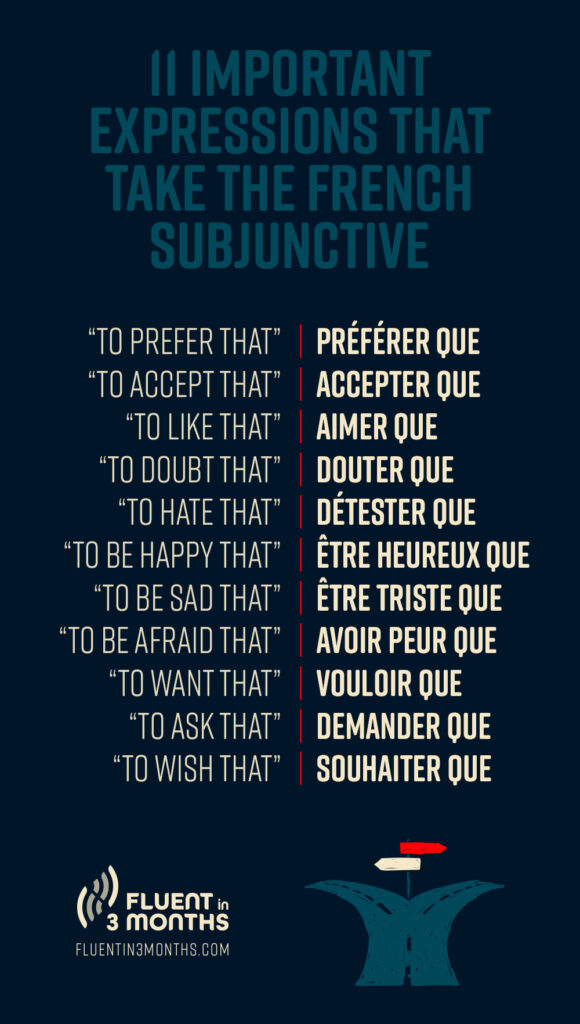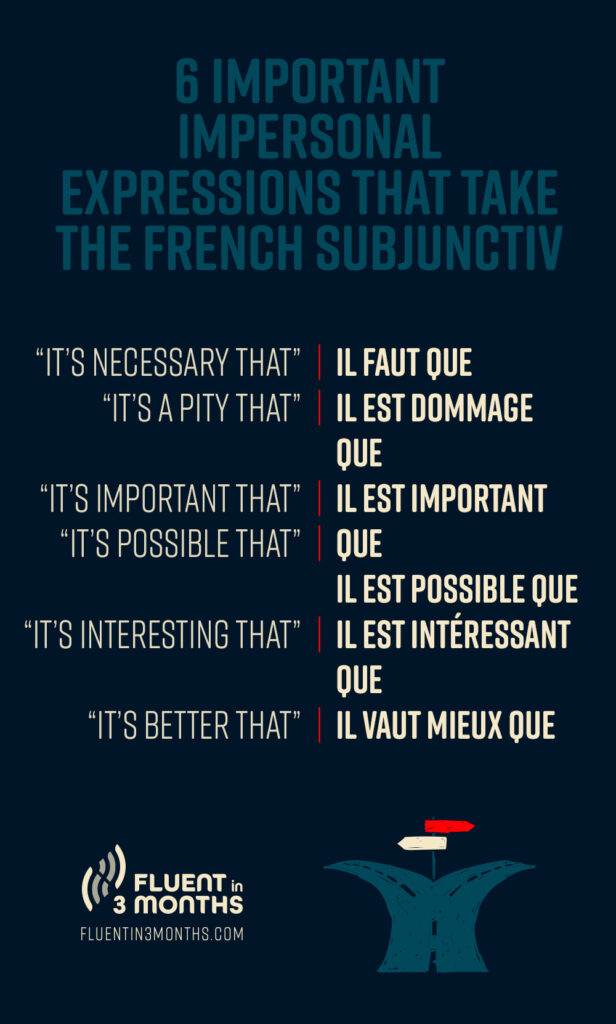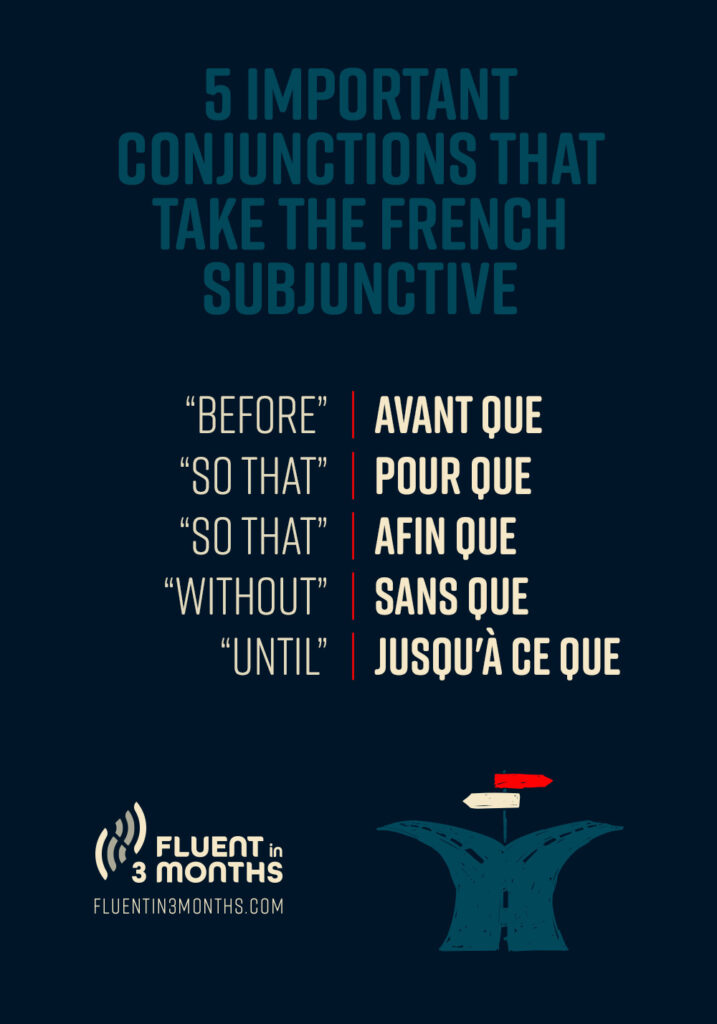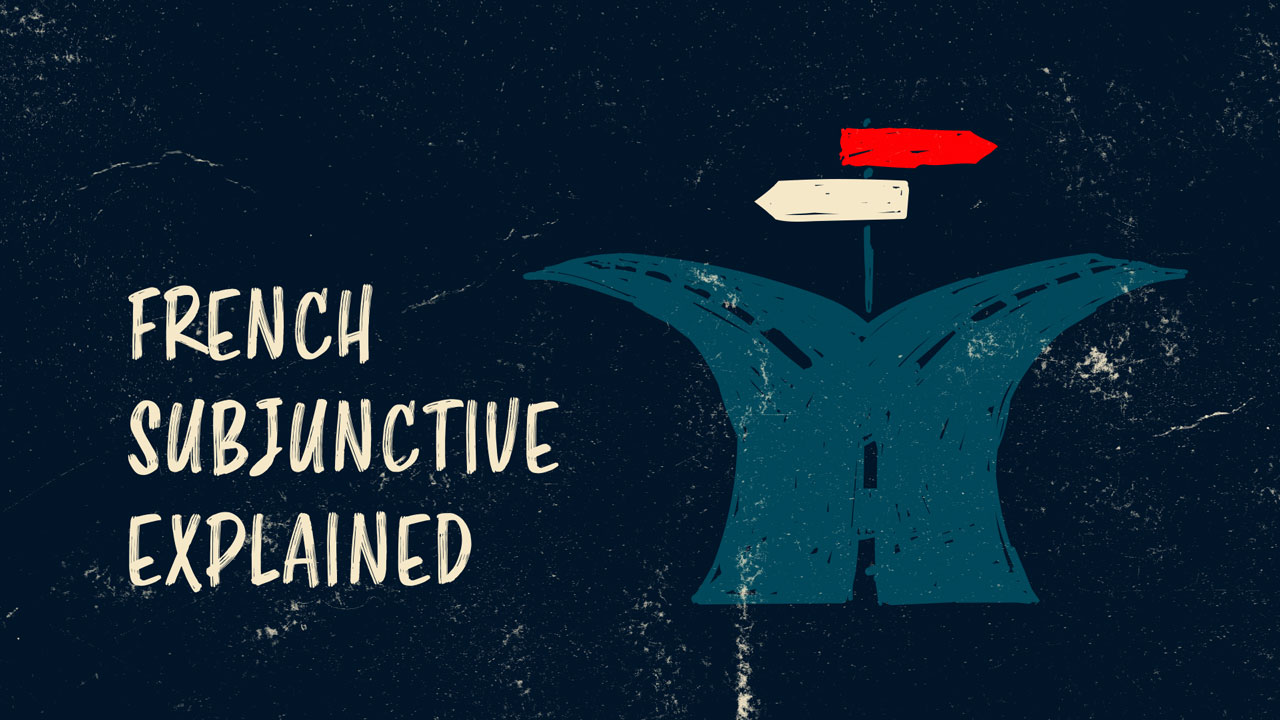French Subjunctive Explained: What Is It and How to Practice It
Le subjonctif, or the “French subjunctive” can be tricky. Is it a tense? Not really. Is it conjugated like the tenses? Yes, we can say so.
But what is it? The most appropriate way to define the subjunctive would be that it’s a verb mood. It’s used to express some feelings, such as uncertainty, emotion, doubt, judgment, and hypothetical situations.
I know this sounds vague — I definitely thought so when I first learned about the subjunctive as a 17-year old high school student.
Today, after over ten years and a degree in French, I think one of the best ways of learning the subjunctive is to really understand its logic and memorize some important phrases that require the subjunctive. Then, it will start making a lot more sense!
Table of contents
What is the Subjunctive?
The subjunctive is a verb mood that allows you to express things that are subjective, uncertain, or unreal. Although it requires the verbs to be conjugated in specific ways, it’s not a tense.
Think of it as a similar concept to the English phrases “I wish,” “If I were,” “It’s necessary to,” and so on. These don’t describe reality — they express a hypothetical or unlikely situation, or a feeling like doubt, uncertainty, desire, emotion, or necessity.
Let’s start with an example sentence: “It is necessary that you do your homework.” In French, “it’s necessary that” is il faut que. This phrase expresses obligation and demands the subjunctive form. So it would be il faut que tu fasses tes devoirs. Fasses, here, is the subjunctive form of faire (“to do”).
Another example: Je veux que tu sois heureuse, “I want you to be happy.” Sois is the subjunctive form of être. It has to be in subjunctive because it expresses desire.
Have you noticed another common theme in the two examples we covered? Il faut que tu fasses tes devoirs and je veux que tu sois heureuse both include que. The subjunctive almost always comes after phrases that have que or qui. But be careful: not all phrases with que include the subjunctive. For objective statements, we use the indicative mood.
The essential French phrases you covered so far are likely to be in the indicative mood:
- Je fais mes devoirs. “I do my homework.”
- Il est fatigué. “He is tired.”
- Ça fait deux heures que j’attends. “I’ve been waiting for two hours.” (We don’t need the subjunctive here since we stated a fact.)
The subjunctive is widely used in French daily life. This means that you’ll hear it often in films, books, or songs.
When to Use the Subjunctive
We already mentioned that the subjunctive in French is a verb mood, used in specific cases for specific feelings. But what are those feelings and cases? Let’s take a more detailed look:
After Expressions of Doubt, Emotion, Need, or Uncertainty
Anytime you express doubt, disbelief, emotion, or uncertainty with a phrase with que, the subjunctive follows. Here are some examples:
- Je doute qu’il vienne. “I doubt that he will come.”
- J’ai peur qu’il ne soit en retard. “I’m afraid that he will be late.”
- Je suis triste que tu ne sois pas ici. “I’m sad that you’re not here.”
Start by checking out these expressions that require the subjunctive in French. You’ll hear them often, be it on the news, in discussions with friends, or in podcasts:
| English | French | Audio |
|---|---|---|
| “to prefer that” | préférer que | |
| “to accept that” | accepter que | |
| “to like that” | aimer que | |
| “to doubt that” | douter que | |
| “to hate that” | détester que | |
| “to be happy that” | être heureux que | |
| “to be sad that” | être triste que | |
| “to be afraid that” | avoir peur que | |
| “to want that” | vouloir que | |
| “to ask that” | demander que | |
| “to wish that” | souhaiter que |

After Certain Impersonal Expressions
Some impersonal expressions, which include il + verb naturally express need, judgment, or emotion in a way that would require the subjunctive.
- Il faut que tu viennes me voir. “It is necessary that you come see me.”
- Il est dommage que tu ne puisses pas venir. “It’s a pity that you cannot come.”
- Il est important que vous soyez à l’heure. “It is important that you be on time.”
- Il vaut mieux qu’on parte maintenant. “It is better that we leave now.”
- Il est possible que je vienne demain. “It is possible that I will come tomorrow.”
Be careful — not all of them take the subjunctive. For example, il est clair que (“it is clear that”) doesn’t need it, as we’re talking about something clear and certain. Here are some common impersonal expressions that take the subjunctive:
| English | French | Audio |
|---|---|---|
| “It’s necessary that” | Il faut que | |
| “It’s a pity that” | Il est dommage que | |
| “It’s important that” | Il est important que | |
| “It’s possible that” | Il est possible que | |
| “It’s interesting that” | Il est intéressant que | |
| “It’s better that” | Il vaut mieux que |

After Certain Conjunctions
Certain conjunctions that express subjectivity or unreality require the subjunctive. For example, avant que (“before”) is followed by the subjunctive because it introduces an action or event that has not yet occurred, so it’s uncertain. Après que (after), on the other hand, doesn’t need the subjunctive, as the events have already occurred, so we’re talking about facts.
Here are some example sentences with conjunctions that require the subjunctive.
- Appelle-moi avant que tu partes. “Call me before you leave.”
- J’étudie pour que je puisse réussir à l’examen “I study so that I can pass the exam.”
- *Elle est perfectionniste. Elle va travailler sur le projet **jusqu’à ce qu’*il soit parfait. “She’s a perfectionist. She will work on the project until it’s perfect.”
| English | French | Audio |
|---|---|---|
| “before” | avant que | |
| “so that” | pour que | |
| “so that” | afin que | |
| “without” | sans que | |
| “until” | jusqu'à ce que |

Forming the Subjunctive
Now that we’ve covered when to use the subjunctive mood, let’s look at how to put French verbs in the subjunctive form.
Regular Verb Conjugations
Regular verbs follow a straightforward pattern in subjunctive.
For first-group verbs, like parler, the subjunctive is almost the same as the present tense. We take the root of the verb by checking the ils/elles conjugation in the present tense. It’s ils/elles parlent, and to take the root, we need to remove the -ent. This leaves us with the root parl- which we need to add these suffixes for each person, respectively: -e, -es, -e, -ions, -iez, and -ent.
Parler (to speak)
que je parle
que tu parles
qu’il/elle/on parle
que nous parlions
que vous parliez
qu’ils/elles parlent
For second-group verbs, like finir the subjunctive looks a little different than the present tense. The root of the verbs are again found by looking at the ils/elles conjugation. Ils/elles finissent, leaves us with the root finiss- which we need to add -e, -es, -e, -ions, -iez, and -ent.
Finir (to finish)
que je finisse
que tu finisses
qu’il/elle/on finisse
que nous finissions
que vous finissiez
qu’ils/elles finissent
Irregular Verbs
Unfortunately, many of the most common French verbs are irregular in the subjunctive. The best way to learn them is by practice. At first, try to recognize them in your textbooks, or the French content you follow. Then, you’ll be more familiar with the irregular verbs and use them when necessary.
Here are the subjunctive forms for some key irregular verbs:
| English Verb | French Verb | Subjunctive Conjugation |
|---|---|---|
| “To be” | Être | que je soisque tu soisqu'il/elle/on soitque nous soyonsque vous soyezqu'ils/elles soient |
| “To have” | Avoir | que j'aieque tu aiesqu'il/elle/on aitque nous ayonsque vous ayezqu'ils/elles aient |
| “To go” | Aller | que j'ailleque tu aillesqu'il/elle/on ailleque nous allionsque vous alliezqu'ils/elles aillent |
| “To do” | Faire | que je fasseque tu fassesqu'il/elle/on fasseque nous fassionsque vous fassiezqu'ils/elles fassent |
| “To come” | Venir | que je vienneque tu viennesqu'il/elle/on vienneque nous venionsque vous veniezqu'ils/elles viennent |
| “To know” | Savoir | que je sacheque tu sachesqu'il/elle/on sacheque nous sachionsque vous sachiezqu'ils/elles sachent |
| “To be able to” | Pouvoir | que je puisseque tu puissesqu'il/elle/on puisseque nous puissionsque vous puissiezqu'ils/elles puissent |
| “To take” | Prendre | que je prenneque tu prennesqu'il/elle/on prenneque nous prenionsque vous preniezqu'ils/elles prennent |
How to Use the Subjunctive in the Past Tense
For compound tenses like the passé composé, you’ll use the subjunctive form of avoir or être, followed by the past participle if your phrase needs the subjunctive.
- Il est dommage qu’elle ne soit pas venue. “It’s a pity that she didn’t come.”
- Je doute qu’ils aient compris la leçon. “I doubt that they understood the lesson.”
Tips for Remembering the French Subjunctive
For native speakers, using the subjunctive comes naturally. For learners, it comes with a lot of practice! While learning the subjunctive, keep in mind that making mistakes is normal, and no one will judge you for using the indicative instead of the subjunctive. Here are some study tips:
Look for Patterns
In this article, you’ll find over 20 expressions and conjunctions that require the subjunctive. We didn’t choose them randomly — they’re there because they appear often in French conversations. A good way to start practicing the subjunctive is to study these phrases.
For example, il faut que (“it is necessary that”) always needs the subjunctive. If you often hear people saying il faut que j’aille (“it’s necessary that I leave/I need to leave”), that’s a perfect opportunity to learn that il faut que is a subjunctive phrase, and aille is the subjunctive of aller (“to go”).
Study Irregular Verb Forms
As we saw earlier, many common verbs are irregular in the subjunctive. Once you’ve learned some key phrases that take the subjunctive, move on to study irregular verbs:
- Il faut qu’il aille au supermarché. “It’s necessary for him to go to the supermarket.” (we used qu’il aille, not qu’il va.
- Je doute qu’ils aient de l’argent. “I doubt that they have money.” (we used qu’ils aient, not (qu’ils ont.)
- Je suis heureuse que tu sois là. “I’m happy that you’re here.” (we used que tu sois, not que tu es.
Practicing with Authentic Examples
Expose yourself to the subjunctive through authentic language, such as French movies and songs..
Let’s start by taking a look at this song by Céline Dion, Pour que tu m’aimes encore. Even the title is in subjunctive — pour que is one of the conjunctions that always requires the subjunctive. Pour que tu m’aimes encore translates into “so that you still love me.* In the song, you’ll also hear the phrase Je veux que tu saches, “I want you to know,” which is also in the subjunctive. Saches is one of the subjunctive forms of savoir (“to know”), an irregular verb.
What to Do When You Can’t Remember the Subjunctive Form?
While I do think that you should have a go at conjugating the subjunctive, I won’t say “try anyway, it’s okay to make mistakes!” this time. Instead, I have one last useful tip. In some cases, if you change the sentence structure, it’s possible to avoid the subjunctive. You should just make sure there’s no que in the equation.
Here are some examples:
Il faut que tu sois là, means “it’s necessary for you to be here.” It requires the subjunctive because it expresses necessity with the phrase il faut que. Another sentence that gives a similar meaning is:
Tu dois être là. “You need to be here.” There is no que, and tu dois (“you need to”) is always followed by an infinitive, not the subjunctive.
Mastering the French Subjunctive
Don’t be discouraged by the subjunctive’s reputation as a grammatical beast. Start by recognizing it, then move on to studying key phrases, and finally, start using those phrases. It’s no easy task, but with the right study tips, you’ll master it!



Social